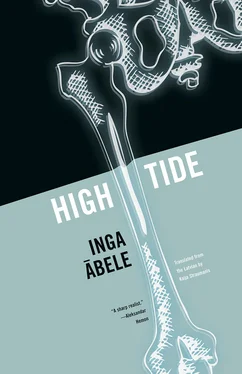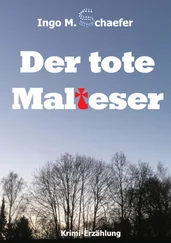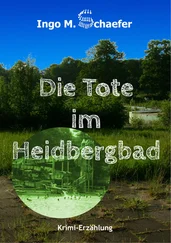Back when Ieva still came to see him, he would start waiting for her three months in advance. Once you’d shown you were hardworking and could behave, you’d get an extended visit. One visit per season. He’d carefully fill out the request form, put down Ieva’s passport information, and write “wife” in block letters on the line above “relationship.” Back then he had a wife.
They usually brought Ieva in first. The prison’s hotel room was a long, narrow bedroom with a window at the end of it looking out onto the inner prison wall. Two beds against opposite walls. Two bare, ugly nightstands. No frills.
She was always sitting on the bed when the guards brought Andrejs in. He liked to think that she sat because her trembling knees would give away her excitement. But maybe she sat so she’d resemble a painting. Because she knew full well — in this empire of ugliness she looked so unnaturally beautiful. Who the hell knows. He was never able to fully understand Ieva.
He already had the feeling back then that she was slowly pulling away from him, that she was already associating with people who stayed out of trouble. And it was only the prison with the clanking of its hundreds of doors, the jangling of keys, narrow hallways, the spots of light on the guards’ uniforms, Andrejs’s shaved head and large eyes in his gaunt, dark face that fused them together — the way only prison can do.
When she stopped coming, he spent the next four years entertaining the thought of killing her once he got out. But that lasted only four years, not longer. No emotion lasts longer than four years without support from God. It was around that time he found that book by the stove in the prison boiler room, read it and calmed down. For life. The only thing he asked of God was to never see Ieva again. Now he’s always on edge whenever he goes to Riga to visit their daughter. Ieva is probably around somewhere. Why shouldn’t she be?
Just as alive as back then.
His hands would still be behind his back, even though it had been more than thirty seconds since the guard had removed the handcuffs and left the room. Andrejs grinned like an idiot every time — maybe Ieva didn’t notice, at least he liked to think so. Grinned like an idiot and rubbed his wrists.
Then — and then he’d rush to the bed and pull her into his lap like a cat, warmth all around and their scents mixed together. They’d sit for a long time, pressed into each other, filling each other’s contours, almost motionless. Breathing each other in.
And then they’d start to talk.
Finally Ieva would break free and they’d start to make dinner. Outside would be growing dark.
Like in that one song — just the two of them, alone in this world — what was that song? It doesn’t matter. There are so many songs like that and all the singers in the world sing about it.
But the feeling was so rare. It was like the world had just been created. And they were the first two people in it.
Two people protected by a barbed wire fence, dogs, and guns.
It had been so beautiful. As if Andrejs even understands anything about words, anything about the word “beauty,” for example, because no one ever really taught him the meaning of words. Everything he knows he knows from observation. Jesus! — who was going to teach words to a farm boy like him? “Get lost!” or “Take ’im, he’s in the way!”—behold, his lesson. Ieva added the word “beauty” to his vocabulary later, but she spoke differently; she was his Gospel. She would even read aloud to him at the Zari house. Books. At night! Before going to bed — like for a kid.
But that’s just how she was: she’d spend the day thinking and talking to herself, and at night she’d look for answers in books and even read aloud to him. And why not? It’s tough when you live out in the country, surrounded by black woods. Where the darkness quickly thickens in the snowless winters, and you can hear the constant rush of the ocean from the north. You could go crazy. But they had their little room and their large bed, and the yellow-painted light bulb hanging bare above them. And Ieva reading out loud to Andrejs. He’d warn her ahead of time that he’d fall asleep. That kind of reading reminded him of his mother’s lectures. Ieva was his Gospel, his mother — the Law. The only time his mother could hold him when he was little was at bedtime; the rest of the time she could neither control him, nor find him. Skis, a shotgun, a hunk of bacon, and his dog — that’s all he needed.
True, when Ieva read Knut Hamsun to him, he didn’t fall asleep so quickly. The woods, a dog, a girl. The dog shot dead in honor of the proud girl. Andrejs understood all of it, there was nothing to discuss.
There was also — who was it again — Trygve Gulbranssen, Beyond Sing the Woods . Another Norwegian writer. The woods, darkness, horses, and the proud Christina. And everything carried this sense of a larger, more respectable life. It was natural.
How beautiful, Ieva had said.
Beauty!
To her, the greatest beauty could be found in the thing Andrejs hated the most — some kind of statement or phrase. She’d read those phrases over and over again and almost tremble with joy.
Ridiculous.
Why spend so much time digging around words? Outside there was real life, the woods, a tractor, livestock, and most of all — a husband. Andrejs gave up so much for them to have a life together: his skis, his shotgun, and even the woods. Because they had to make ends meet, save money. But she just re-read sentences. What’s the big deal, he’d often ask, it’s a nice sentence, so move on! But it’s not something real. It was better to steer clear of fantasies, awful things that they were.
Like that novel The Idiot , which Ieva found particularly beautiful. Jesus Christ! The definition of boredom.
When she opened that book, he’d fall asleep without the tiniest hint of regret. Dostoevsky could mess with your mind, and let him, but you were responsible for paying attention and drawing that line when the time came. Andrejs remembers what the book looked like: a Soviet era publication with a bluish-grey canvas cover, with a really stupid-looking cherry red picture at one corner of a man and woman with tiny waists caught up in dance. Ieva was pregnant then. He remembers what she looked like just as well as he remembers the book. The soft skin of her round stomach, the silky, soft triangle at its base and her breasts, hard and protruding like the horns of a stag, and with large, dark tips. None of that tiny waist crap. At that time all Ieva would eat was sprats with rye bread. The effects of the pregnancy were like that — she’d make him run into town for sprats if there weren’t any in the fridge, even if it was the middle of the night. Downed them with rye bread like a madwoman. Lost a lot of weight. The doctors warned her, but nothing helped. She was stubborn.
They made love each night, and sometimes afterwards Ieva would read aloud.
It all happened in that one year — falling in love, a child, turning eighteen, a wedding, the collapse of the Soviet Union — boom! An entire lifetime over the course of twelve months. Ieva cried. The whole year. It’s no surprise Monta grew up so sensitive. If anything she’s neurotic, because Ieva spent the entire year crying. Pregnant women shouldn’t act like that, he’s convinced. Even if the empire collapses.
Monta was born while he was away. He’d driven out to the border to clear a forest in Nīkrace. He tore all the way back across Latvia to get back home to the Zari house once he heard the news. He wanted to bring his daughter home himself, in the tractor. Ieva wouldn’t let him, said she wanted to get home by taxi. Again with some kind of fantasy she’d gotten from a book.
Читать дальше












